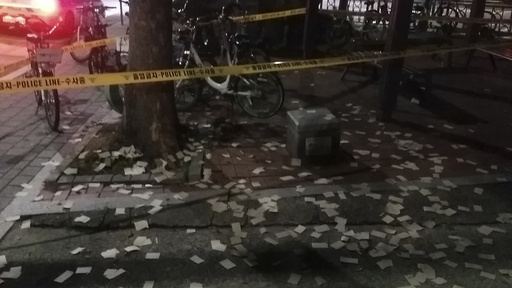SEOUL, South Korea (AP) — South Korea on Sunday resumed anti-North Korean propaganda loudspeaker broadcasts in border areas in retaliation for the North sending over 1,000 balloons filled with trash and manure over the last couple of weeks.
The move is certain to anger Pyongyang and could trigger retaliatory military steps as tensions between the war-divided rivals rise while negotiations over the North’s nuclear ambitions remain stalemated.
Hours after the South resumed loudspeaker broadcasts, the powerful sister of North Korean leader Kim Jong Un warned that the South created a “prelude to a very dangerous situation.” She said South Korea would witness an unspecified “new response” from the North if it continues with the broadcasts and fails to stop civilian activists from flying anti-North Korean propaganda leaflets across the border.
“I sternly warn Seoul to immediately case its dangerous activities that would further provoke a crisis of confrontation,” Kim Yo Jong said in a statement published by North Korea’s official Korean Central News Agency.
It came shortly after South Korea’s military said it detected North Korea launching what appeared to be more trash-carrying balloons Sunday night. The military did not immediately confirm the number of suspected balloons or whether any of them had already landed in the South.
South Korea’s Joint Chiefs of Staff confirmed that the military conducted a loudspeaker broadcast Sunday afternoon. It didn’t specify the border area where it took place or what was played over the speakers.
“Whether our military conducts an additional loudspeaker broadcast is entirely dependent on North Korea’s behavior,” it said.
The South had withdrawn loudspeakers from border areas in 2018, during a brief period of engagement with the North under Seoul’s previous liberal government.
At an emergency meeting led by national security director Chang Ho-jin, South Korean officials berated Pyongyang for attempting to cause “anxiety and disruption” by sending the balloons to the South and stressed that North Korea would be “solely responsible” for any future escalation of tensions.
The North said its balloon campaign came after South Korean activists sent over balloons filled with anti-North Korean leaflets, as well as USB sticks filled with popular South Korean songs and dramas. Pyongyang is extremely sensitive to such material and fears it could demoralize front-line troops and residents and eventually weaken leader Kim Jong Un’s grip on power, analysts say.
South Korea has in the past used loudspeakers to blare anti-Pyongyang broadcasts, K-pop songs and international news across the rivals’ heavily armed border.
In 2015, when South Korea restarted loudspeaker broadcasts for the first time in 11 years, North Korea fired artillery rounds across the border, prompting South Korea to return fire, according to South Korean officials. No casualties were reported.
Last week, as tensions spiked over the trash-carrying balloons, South Korea also suspended a 2018 agreement to reduce hostile acts along the border, allowing it to resume propaganda campaigns and possibly restart live-fire military exercises in border areas.
South Korean Defense Minister Shin Won-sik in a meeting with top military commanders called for thorough preparation against the possibility that the North responds to the loudspeaker broadcasts with direct military action, his ministry said in a statement.
North Korea continued to fly hundreds of balloons into South Korea over the weekend, a third such campaign since late May.
The South’s military said the balloons that did land dropped trash, including plastic and paper waste, but no hazardous substances were discovered.
In her statement, Kim Yo Jong claimed the North used about 1,400 balloons to drop 7.5 tons of trash from Saturday night to Sunday morning. She also complained that anti-North Korean propaganda leaflets flown from South Korean activists had been discovered in border areas in recent days.
She said the North had initially planned to halt its balloon launches on Sunday but decided to send more because the South restarted loudspeaker broadcasts.
The South’s military, which has mobilized chemical rapid response and explosive clearance units to retrieve the North Korean balloons and materials, alerted the public to beware of falling objects and not to touch balloons found on the ground but report them to police or military authorities.
In North Korea’s previous two rounds of balloon activities, South Korean authorities discovered about 1,000 balloons that were tied to vinyl bags containing manure, cigarette butts, scraps of cloth, waste batteries and waste paper. Some were popped and scattered on roads, residential areas and schools. No highly dangerous materials were found and no major damage has been reported.
A South Korean civilian group led by North Korean defector Park Sang-hak said it launched 10 balloons on Thursday carrying 200,000 anti-North Korean leaflets, USB sticks with K-pop songs and K-dramas, and $1 bills. South Korean media reported another activist group also flew balloons with 200,000 propaganda leaflets toward North Korea on Friday.
Kim Jong Un in recent years has waged an intensifying campaign to eliminate South Korean cultural and language influences. In January, Kim declared the North would abandon its longstanding goal of a peaceful unification with the South and rewrite its constitution to cement the South as a permanent enemy. Experts say Kim’s efforts to reinforce the North’s separate identity may be aimed at strengthening the Kim family’s dynastic rule.



